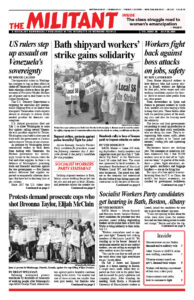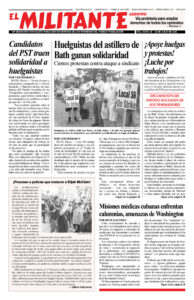Determined to remove the military from Sudan’s transitional government, tens of thousands of working people joined demonstrations in cities and towns across the country June 30.
After weeks of massive protests and street battles with the military in the spring of last year, an agreement was brokered by the African Union and a number of capitalist governments in the region on July 5, 2019. It established a three-year transitional administration in which army generals were to share office with protest leaders and opposition political parties. That government is headed by Prime Minister Abdalla Hamdok.
The widely hated regime of Gen. Omar al-Bashir, which came to power in a coup 30 years earlier, was forced out by mass protests in April 2019, replaced with a new military government. The protests, begun by working people against sharp price hikes, were fueled by decades of political repression and the deadly impact of the civil wars waged by Sudan’s capitalist rulers. After weeks of battles against brutal attacks by the new regime, hundreds of thousands took to the streets June 30.
A year later “the army is ruling the country, not civilians,” Amged Alzain told Middle East Eye at a protest in the Burri district of the capital, Khartoum. “They are leading the economy and the market through the companies of the army, they are controlling security — we haven’t achieved the goals of the revolution and this is why we are protesting again.”
Demonstrators also demanded the trial of leading figures from Bashir’s regime they hold responsible for the slaughter of hundreds of anti-government protesters during his final months in office. Bashir was convicted of corruption in December and sentenced to two years behind bars.
“Carry out reforms, Hamdok, do not fail those who brought you to power,” chanted demonstrators in Dongola, in the north of the country.
In eastern Sudan demonstrators demanded the government take steps to halt water shortages and condemned its decision to raise bread prices in May.
Economic crisis worsens
An annual inflation rate of over 100% is devastating the lives of Sudanese working people, on top of the effect of the worldwide capitalist social and economic crisis.
In April the government imposed a lockdown in the name of reducing the spread of coronavirus. It pledged to provide aid to some of those thrown out of work. But three months later many people say they have yet to receive promised food baskets.
The June 30 protests spread in all five states in Sudan’s Darfur region, where marchers raised additional demands for the disarmament of militias used by the former Bashir regime in its war against the people of Darfur and the removal of state governors, appointed by the military. Days later one of the governors resigned.
“Little has changed in Darfur since last year,” Moubarak Sinini, a worker from Darfur now living in the U.K., told the Militant by phone July 5. “Militias still operate there and make it hard for farmers to get access to their land or collect firewood.”
Bashir sustained his rule by building on national and religious divisions fostered by the British colonial rulers among the country’s toiling majority before the country’s independence in 1956.
Different black African peoples in Darfur have faced systematic discrimination and brutality for decades, at the hands of governments loyal to the country’s ruling capitalist families based among the Arab population.
Beginning in 2003 Bashir’s forces killed tens of thousands and forced millions to flee their homes in the region as they fought rebel groups demanding greater autonomy. Negotiations continue today between Hamdok’s administration and these groups over their representation in the transitional government.
Darfur had been an independent Islamic Sultanate for centuries until it was conquered by the British in 1916 and made part of Sudan.
Just before he was forced from office, Bashir claimed nationwide protests against his rule were incited by people from Darfur. “We are all Darfuris,” demonstrators around the country chanted in reply.
The June 30 protests were organized by the Sudanese Professionals Association, a middle-class-led coalition that coordinated the actions that led to the ouster of Bashir.
Dag Tirsén in London contributed to this article.

